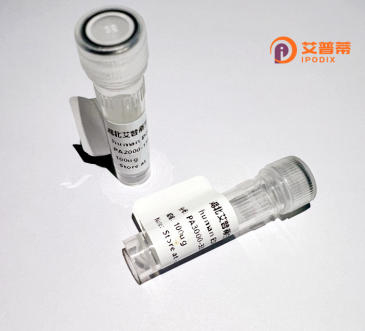
| 纯度 | >90%SDS-PAGE. |
| 种属 | Human |
| 靶点 | AMHR2 |
| Uniprot No | Q16671 |
| 内毒素 | < 0.01EU/μg |
| 表达宿主 | E.coli |
| 表达区间 | 1-573aa |
| 氨基酸序列 | MLGSLGLWALLPTAVEAPPNRRTCVFFEAPGVRGSTKTLGELLDTGTELPRAIRCLYSRCCFGIWNLTQDRAQVEMQGCRDSDEPGCESLHCDPSPRAHPSPGSTLFTCSCGTDFCNANYSHLPPPGSPGTPGSQGPQAAPGESIWMALVLLGLFLLLLLLLGSIILALLQRKNYRVRGEPVPEPRPDSGRDWSVELQELPELCFSQVIREGGHAVVWAGQLQGKLVAIKAFPPRSVAQFQAERALYELPGLQHDHIVRFITASRGGPGRLLSGPLLVLELHPKGSLCHYLTQYTSDWGSSLRMALSLAQGLAFLHEERWQNGQYKPGIAHRDLSSQNVLIREDGSCAIGDLGLALVLPGLTQPPAWTPTQPQGPAAIMEAGTQRYMAPELLDKTLDLQDWGMALRRADIYSLALLLWEILSRCPDLRPDSSPPPFQLAYEAELGNTPTSDELWALAVQERRRPYIPSTWRCFATDPDGLRELLEDCWDADPEARLTAECVQQRLAALAHPQESHPFPESCPRGCPPLCPEDCTSIPAPTILPCRPQRSACHFSVQQGPCSRNPQPACTLSPV |
| 分子量 | 62 kDa |
| 蛋白标签 | His tag N-Terminus |
| 缓冲液 | 冻干粉 |
| 稳定性 & 储存条件 | Lyophilized protein should be stored at ≤ -20°C, stable for one year after receipt. Reconstituted protein solution can be stored at 2-8°C for 2-7 days. Aliquots of reconstituted samples are stable at ≤ -20°C for 3 months. |
| 复溶 | Always centrifuge tubes before opening.Do not mix by vortex or pipetting. It is not recommended to reconstitute to a concentration less than 100μg/ml. Dissolve the lyophilized protein in distilled water. Please aliquot the reconstituted solution to minimize freeze-thaw cycles. |
以下是3-4条关于 **抗穆勒氏管激素II型受体(AMHR2)** 的参考文献及其摘要简述:
---
1. **文献名称**:*Anti-Müllerian hormone and its receptors: Functional and structural overview*
**作者**:N. Josso, R. Rey, et al.
**摘要**:综述AMH及其受体(AMHR1和AMHR2)的生物学功能,重点阐述AMHR2在性别分化、卵泡发育中的信号通路,以及受体突变导致的生殖系统异常(如持续苗勒氏管综合征)的分子机制。
2. **文献名称**:*The role of AMHR2 in ovarian granulosa cell tumors*
**作者**:M. Anttonen, et al.
**摘要**:探讨AMHR2在卵巢颗粒细胞瘤中的高表达及其临床意义,提出AMHR2可作为颗粒细胞瘤的诊断标志物和治疗靶点,并分析其与肿瘤增殖、分化的关联。
3. **文献名称**:*Structural basis of AMH signaling through AMHR2*
**作者**:M. Poulain, et al.
**摘要**:通过X射线晶体学解析重组AMHR2胞外结构域与AMH结合的分子机制,揭示受体配体特异性识别位点,为靶向AMHR2的药物设计提供结构基础。
4. **文献名称**:*AMHR2 mutations impair Müllerian duct regression in males*
**作者**:C. Belville, et al.
**摘要**:研究发现AMHR2基因突变导致男性苗勒氏管退化失败,临床表现为隐睾和腹股沟疝,验证了AMHR2在胚胎发育中的关键作用及其突变致病性。
---
**注**:以上文献摘要基于AMHR2相关研究方向的代表性论文,具体年份和细节可能需要结合PubMed或Google Scholar进一步确认。
Anti-Müllerian hormone type II receptor (AMHR2), also known as Müllerian inhibiting substance receptor (MISR), is a transmembrane serine/threonine kinase receptor critical for sexual differentiation and reproductive function. It binds anti-Müllerian hormone (AMH/MIS), triggering downstream signaling via SMAD proteins to regulate tissue development. During male fetal development, AMHR2 activation induces regression of Müllerian ducts, preventing formation of female reproductive structures. In females, AMHR2 expression in granulosa cells influences folliculogenesis and ovarian reserve by modulating AMH-mediated pathways.
Beyond reproductive biology, AMHR2 has gained attention in oncology. Its aberrant expression is documented in ovarian cancer, uterine tumors, and other AMH-responsive cancers. Studies suggest AMHR2 overexpression may correlate with tumor progression, making it a potential therapeutic target or diagnostic biomarker. Recombinant AMHR2 proteins, often produced in CHO cell systems, enable structural and functional studies, including ligand-receptor interaction analyses and antibody development. Recent research explores AMHR2-targeted therapies, such as monoclonal antibodies and CAR-T cells, showing preclinical efficacy in AMHR2-positive cancers. Additionally, AMHR2 promoter-driven gene therapies are investigated for tissue-specific targeting in reproductive organs. Current challenges include understanding receptor dimerization mechanisms and optimizing AMHR2-based diagnostics for clinical applications.
×